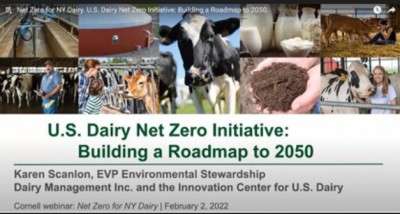What is the Net Zero Initiative for US Dairy? - by Lindsay Ferlito

What is the Net Zero Initiative for US Dairy?
In February, CCE Dairy Specialists from across the state and PRO-DAIRY hosted a 2-part virtual program titled "Net Zero for Dairy: What you Need to Know". The first presentation was from Karen Scanlon (EVP of Environmental Stewardship for Dairy Management Inc., and the Innovation Center for US Dairy), providing an overview of the Net Zero Initiative. This article will summarize her presentation.
Over the years, dairies have continually become more efficient, producing more milk with fewer resources and reduced greenhouse gas (GHG) emissions. This trend needs to continue at a more aggressive rate to help improve the environmental sustainability of the industry and meet consumer demands. Scanlon gave an overview of the Net Zero Initiative and outlined the goals from the Innovation Center for Dairy, mainly, "by 2050, U.S. dairy collectively commits to achieve GHG neutrality, optimize water use while maximizing recycling, and improve water quality by optimizing utilization of manure and nutrients." One key word here is "collective", meaning it involves a collaboration from field to farm to processor. This initiative is a collaboration between all dairy farms and several industry partners, including dairy leadership (such as DMI and Innovation Center), research institutions (such as Cornell University), NGOs (such as the Soil Health Institute), and corporate funding partners (such as Starbucks and Nestle). To try to achieve this goal, the Net Zero Initiative is aimed at the farm level, to focus on feed, enteric methane, manure, and energy, and a processor work group is focused for processors to look at GHG, packaging, waste, and water. Additionally, the word "collective" means across all farms and processors, so each individual farm does not have to reach GHG neutrality, but the industry as a whole will. To do so, farms of all sizes and types are encouraged to implement best practices and technologies. The Net Zero Initiative is a 5-year plan to get the industry started to achieve these goals by 2050, and as Scanlon states, it's "focused on action today, but really focused on building that progress over time". Scanlon indicated there are three important aspects to consider with the Net Zero Initiative, including affordability (solutions need to be economically viable for farms and companies), data and research gaps (more knowledge is needed to implement solutions), and accessibility (solutions need to be available for farms of all sizes and shapes). There are currently several research projects as part of the initiative including a dairy soil and water regeneration project looking at soil health and how to reduce GHG, and improve water quality; a greener cattle initiative focused on looking at ways to reduce enteric methane such as through the use of feed additives, genetics, and technology; and creating ways to track progress towards goals and a roadmap for how the industry can achieve these goals. Further, there is a pilot program, titled Dairy Scale for Good, that involves a few commercial dairies that will install technologies and practices to document improvements made in environmental sustainability as well as the economic value that accompanies these gains in sustainability. These farms will act as case studies to help share info and learning outcomes with the rest of the industry. Overall, the Net Zero Initiative is an industry-wide collective goal to reach GHG neutrality and increase environmental sustainability by 2050. Dairy farmers have a great history of aiming to be more efficient and sustainable, and this initiative is the next step and outlines plans to continually improve. Farms are encouraged to voluntarily adopt best practices and solutions to help achieve this goal. Scanlon outlined success of the program is described as when "farmers are enabled, progress is demonstrated, and consumer trust in dairy is reinforced". There is a resource library for farms to learn more about the initiative and sustainable practices, including:
- FARM Program Environmental Stewardship Guide (https://nationaldairyfarm.com/... )
- Newtrient blog with info and webinars on manure management (https://www.newtrient.com/blog... )
- Additional info at https://www.usdairy.com/sustai... To watch this webinar, or others from the "Net Zero for Dairy" program, click here: https://www.youtube.com/playli...
Upcoming Events
Boots in the Barn: Cornell Dairy Research Updates
January 13, 2026
January 20, 2026
January 27, 2026
February 3, 2026
February 10, 2026
February 17, 2026
February 24, 2026
Join us for some or all!
Advanced Hoof Health Program
January 15, 2026
Belfast, NY
Who should attend?
- Professional hoof trimmers
- Dairy farm owners or managers in charge of farm foot health
Topics include:
- How to Create a Strategic Trimming Program for your Dairy
- The Latest in Lameness Technology for the Dairy Industry
- Housing and Flooring Design: Its Role in Hoof Care
NY Pork Producers Connection Breakfast - Geneseo
January 17, 2026 : Pork Producers Connection Breakfast - Geneseo
Geneseo, NY
All pork producers are invited to join the New York Pork Producers for a free hot farmer's breakfast, at which they'll catch up on topics including the pork to dairy barn conversion series, NYPP digital campaigns, and 840-RFID tags.
Announcements
Cows, Crops & Critters Newsletter Sponsorship
TRYING TO REACH GROWERS AND AGRIBUSINESSES IN OUR SOUTHWEST REGION OF NEW YORK?Weekly Email Update: Shared with 625+ households who have signed up with our program.
Monthly Paper Mailer: To reach our stakeholders and farmers who lack internet access, we send out a monthly mailer where your company's logo and contact information would be featured with a mailing list of 330+ households.
If you sponsor our weekly and monthly publications you reach approximately 955 households.





